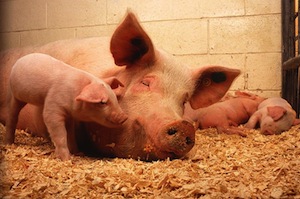
Is that a city pork or a country pork?
The fate of federal broadband subsidies in rural areas might hinge on a debate going on in Washington over food stamps. Every few years (five or whenever they happen to get around to it…) congress has to reauthorise the massive and complex system for managing and supporting U.S. agribusiness.
The farm bill, as it’s commonly called, has exploded far beyond crop insurance and commodity price supports. With a price tag approaching a trillion dollars, it’s become a vehicle to, among other things, direct federal funds toward rural development and urban social programs. Particularly food stamps, notwithstanding the fact that the program is well used in farm country too.
That urban-rural straddle has kept the dollars flowing for more than fifty years. But there are hints the end is in sight.
The senate passed its version of the farm bill last month, including a hefty helping of cash that, among other things, establishes a pilot program for rural fiber-to-the-home projects. And reauthorises the food stamp program.
That bill bounced back to the house of representatives where it hit a brick wall . Democrats who thought it trimmed too much out of food stamps and republicans who wanted the cuts to go deeper voted defeated it. This stand off could last long enough to let current programs expire and default back to a law passed in 1949.
An alternative that’s been floated this week, though, would split off food stamps and similar programs into separate legislation. Rural broadband subsidies would, in all likelihood, stay with the farm bit of the bill. But losing what amounts to automatic support from urban interests would lead to aggressive horse trading. The end of the grand bargain could mean the end of an easy ride through congress for rural development programs.
